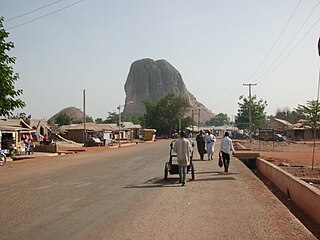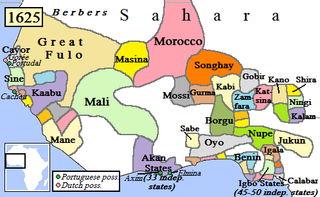Related Research Articles

Kano is a city in northern Nigeria and the capital of Kano State. It is the second largest city in Nigeria after Lagos, with over ten million citizens living within 449 km2 (173 sq mi). Located in the Savanna, south of the Sahel, Kano is a major route of the trans-Saharan trade, having been a trade and human settlement for millennia. It is the traditional state of the Dabo dynasty who have ruled as emirs over the city-state since the 19th century. Kano Emirate Council is the current traditional institution inside the city boundaries of Kano, and under the authority of the Government of Kano State.

The culture of Nigeria is shaped by Nigeria's multiple ethnic groups. The country has 527 languages, seven of which are extinct. Nigeria also has over 1150 dialects and ethnic groups. The three largest ethnic groups are the Hausas that are predominantly in the north, the Yorubas who predominate in the southwest, and the Igbos in the southeast. There are many other ethnic groups with sizeable populations across the different parts of the country. The Kanuri people are located in the northeast part of Nigeria, the Tiv people of north central and the Efik-Ibibio are in the south south. The Bini people are most frequent in the region between Yorubaland and Igboland.

Borno State is a state in the North-East geopolitical zone of Nigeria, bordered by Yobe to the west, Gombe to the southwest for 93 km, and Adamawa to the south while its eastern border forms part of the national border with Cameroon for about 426 km, its northern border forms part of the national border with Niger, for about 223 km mostly across the Komadougou-Yobe River, and its northeastern border forms all of the national border with Chad for 85 km, being the only Nigerian state to border three foreign countries. It takes its name from the historic emirate of Borno, with the emirate's old capital of Maiduguri serving as the capital city of Borno State. The state was formed in 1976 when the former North-Eastern State was broken up. It originally included the area that is now Yobe State, which became a distinct state in 1991.
Suleja is a city in Niger State, Nigeria, pop. (2016) local government area, 260,240, just north of Abuja, capital of the Suleja Emirate. It is sometimes confused with the nearby city of Abuja, due to its proximity, and the fact that it was originally called Abuja before the Nigerian government adopted the name from the then Emir Sulayman Bal for its new federal capital in 1976.

Jukun are an ethno-linguistic group or ethnic nation in West Africa. The Jukun are traditionally located in Taraba, Benue, Nasarawa, Plateau, Adamawa, Bauchi and Gombe States in Nigeria and parts of northwestern Cameroon. They are descendants of the people of Kwararafa. Most of the tribes in the north central of Nigeria trace their origin to the Jukun people and are related in one way or the other to the Jukuns. Until the coming of both Christianity and Islam, the Jukun people were followers of their own traditional religions. Most of the tribes, Alago, Agatu, Rendere, Goemai in Shendam, and others left Kwararafa when it disintegrated as a result of a power tussle. The Jukuns are divided into two major groups; the Jukun Wanu and Jukun Wapa. The Jukun Wanu are fishermen residing along the banks of the river Benue and Niger where they run through Taraba State, Benue State and Nasarawa State. The Wukari Federation, headed by the Aku Uka of Wukari, is now the main centre of the Jukun people.
Bura-Pabir is a Chadic language spoken in North-eastern Nigeria by the Babur/Bura people. Dialects include Pela, Bura Pela, Hill Bura, Hyil Hawul, Bura Hyilhawul, and Plain Bura. The language is closely related to Kilba, Chibok, Margi and a few other north-eastern Nigerian Languages.

Wase is a town and Local Government Area (LGA) of Plateau State, Nigeria, situated some 216 km south east of Jos, the Plateau State capital. It shares its name with the nearby Wase River. The population of the LGA was 159,861 people as of 2006, with an urban area of 1750 km².

The Zazzau, also known as the Zaria Emirate, is a traditional state with headquarters in the city of Zaria, Kaduna State, Nigeria. The current emir of Zazzau is H.E Alhaji Ahmed Nuhu Bamalli CFR, who succeeded the former emir, late Alhaji Shehu Idris.
Biu is a town and a Local Government Area (LGA) in southern Borno State of Nigeria. The town is the administrative center of the LGA and was once the capital of the Biu kingdom, and is now capital of the Biu Emirate. Biu lies on the Biu Plateau at an average elevation of 626 meters. The region is semi-arid.

Nigerian traditional rulers often derive their titles from the rulers of independent states or communities that existed before the formation of modern Nigeria. Although they do not have formal political power, in many cases they continue to command respect from their people and have considerable influence in their community.

The Bauchi Emirate was founded by Yaqubu dan Dadi in the early 19th century in what is now Bauchi State, Nigeria, with its capital in Bauchi. The emirate came under British "protection" in the colonial era, and is now denoted a traditional state.

The Emir of Zazzau, known as Sarkin Zazzau in Hausa is the traditional ruler based in Zaria, which was also known as Zazzau in the past. Although in centuries past, the emirs ruled as absolute monarchs, in the 20th and 21st centuries Nigerian traditional rulers hold little constitutional power, but wield considerable behind-the-scenes influence on the government. The emir's residence is in the historic palace in the town of Zaria.
The Biu Emirate is a traditional state based in Biu in Borno State, Nigeria. Prior to 1920 it was referred to as the Biu Kingdom.
The Wukari Federation is a traditional state in Nigeria, a successor to the Kwararafa state of the Jukun people. The state is based in the town of Wukari in Taraba State, in the south of the Benue River basin. The ruler takes the title "Aku Uka".
Shehu Mustapha Idrissa Timta was a Nigerian traditional leader who served as the 3rd Emir of Gwoza from October 1981 until his death in May 2014. He was killed in an attack by Boko Haram terrorists on May 30, 2014.
Mandaragirau is a town in Borno State, Nigeria.
The Tula Kingdom is a Nigerian traditional state in northern Nigeria with its headquarters in Wange, Kaltungo, Local Government Area Gombe. It comprises three districts: Yiri, Baule and Wange, and is located 101 kilometres away from the Gombe State capital and 15 kilometres off the Adamawa-Yola highway. The Present Mai or King Dr Abubakar Buba Atare II is the paramount Ruler and Chairman Tula Chiefdom.
Sidi Dauda Bage, is a retired Nigerian jurist who presides as the 17th Emir of Lafia, a customary emirate in Nigeria. He succeeded the 16th emir, Isa Mustapha Agwai, on 26 March 2019.
The 2023 Borno State gubernatorial election will take place on 18 March 2023, to elect the Governor of Borno State, concurrent with elections to the Borno State House of Assembly as well as twenty-seven other gubernatorial elections and elections to all other state houses of assembly. The election—which was postponed from its original 11 March date—will be held three weeks after the presidential election and National Assembly elections. Incumbent APC Governor Babagana Umara Zulum has been renominated by his party.
The Tangale people are one of the ethnic groups in Northern Nigeria, situated in Gombe State. The Tangale people that majorly speak Tangale got their name from “Tangal”, a chief of Billiri, in the present day Gombe state of Nigeria. It is believed that Tangal was instrumental in organizing the clans under his leadership and because of this, the people under him were referred to as the Tangale.
References
- 1 2 "Bura". Oxford Reference. Retrieved 2022-06-09.
- 1 2 vanguard (2017-05-10). "Full list of all 371 tribes in Nigeria, states where they originate". Vanguard News. Retrieved 2022-10-15.
- ↑ "Dailytrust News, Sports and Business, Politics | Dailytrust". Daily Trust. Retrieved 2022-06-09.
- 1 2 3 etuhube, aniekan (2022-03-14). "Brief history, belief, marriage, and language of Babur Bura people". Pulse Nigeria. Retrieved 2022-06-09.
- 1 2 Coker, Francisca (2021-02-03). "A Brief Walk Into The Lives Of The Babur Bura People - Olatorera For Senate" . Retrieved 2022-06-09.
- ↑ "Biu | Nigeria | Britannica". www.britannica.com. Retrieved 2022-06-09.
- 1 2 3 "AFRICA | 101 Last Tribes - Bura people". www.101lasttribes.com. Retrieved 2022-06-09.
- ↑ Abubakar, Sadiq (2021-01-24). "Zulum presents staff of office to emir of Biu". Blueprint Newspapers. Retrieved 2022-10-15.
- 1 2 "Zulum Presents Staff Of Office To Emir Of Biu – Independent Newspaper Nigeria". independent.ng. Retrieved 2022-10-15.
- ↑ "SHOCKING! See The Babur Bura Tribe In Nigeria Where A Man Organizes His Friends To Capture A Girl For Him As Wife". cdn.scoopernews.com. Retrieved 2022-06-09.